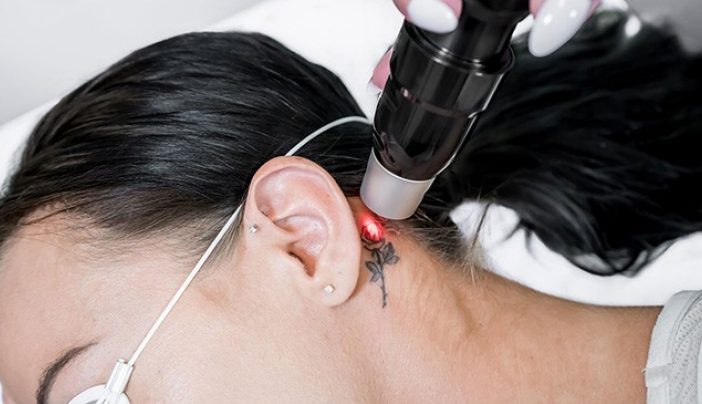The idea of bidding farewell to an unwanted tattoo may seem too good to be true. But how does laser tattoo removal work? Is it harmful to the skin? And is it safe for individuals undergoing cancer treatment? In this article, dermatologist Anisha Patel, M.D., answers these questions and sheds light on the impact of laser tattoo removal on skin health.
Table of Contents
ToggleAre Lasers Used for Tattoo Removal Harmful to the Skin?
“In general, they’re very safe,” assures Patel. Laser tattoo removal targets and breaks down specific color pigments while ensuring the surrounding skin remains unharmed. For multi-colored tattoos, multiple lasers may be necessary, taking into account the colors in the tattoo as well as the individual’s skin color. The laser must be able to differentiate between skin and tattoo colors to avoid burning and scarring. It’s crucial to seek care from an experienced practitioner who possesses the necessary tools and expertise. The FDA approves the lasers used for tattoo removal, and multiple sessions are usually needed for complete removal, scheduled several weeks apart to allow for proper skin recovery.
Are There Side Effects to Tattoo Removal?
Similar to getting a tattoo, the removal process can irritate the skin. “It’s a little bit inflamed afterward because you were just shooting through it with a laser,” explains Patel. Apart from the risk of skin burning or scarring from incorrect laser use, the American Academy of Dermatology notes that skin discoloration may occur after laser tattoo removal, but it typically disappears within a year of treatment. Should any side effects arise after laser tattoo removal, contacting a healthcare provider is recommended.
How Can People Protect Their Skin Before and After Tattoo Removal?
When preparing the skin for tattoo removal, simplicity is key. Patel advises keeping the skin in a natural state, avoiding self-tanner and cosmetic lotions. “You want your skin to be as pale as possible so there’s the least amount of natural pigment in your skin. That makes it easier for the laser to only affect the tattoo pigments,” she advises. Post-removal, a gentle skincare routine is recommended, without the need for any additional steps.
Is Skin More Susceptible to Sunburn or Skin Cancer after Tattoo Removal?
“Removal doesn’t inherently cause any increased risk of skin cancer or sunburn,” states Patel. Nonetheless, it is always important to protect the skin from the sun by covering up or applying sunscreen with at least SPF 30. Ultraviolet radiation from the sun can cause skin damage and skin cancer.
Is It Safe for Cancer Patients to Get Tattoos Removed?
Yes, cancer patients undergoing treatment can receive laser tattoo removal. However, it is crucial for them to choose a skilled provider to ensure proper laser usage, as incorrect procedures can result in burns or open wounds that may impact the immune system. Additionally, the location of the tattoo in relation to the cancer site should be considered. Areas previously subjected to radiation or surgery should be avoided to prevent further trauma to the skin.
Frequently Asked Questions
Q: Is laser tattoo removal safe?
A: Yes, laser tattoo removal is generally safe when performed by an experienced practitioner using FDA-approved lasers.
Q: How many sessions are needed for complete tattoo removal?
A: Multiple sessions are usually required for complete tattoo removal, scheduled several weeks apart to allow for proper skin recovery.
Q: Are there any side effects to tattoo removal?
A: Some side effects include skin irritation, burning, scarring, and temporary skin discoloration, which typically resolves within a year.
Q: Can tattoo removal increase the risk of skin cancer?
A: No, tattoo removal does not inherently increase the risk of skin cancer. However, it is still important to protect the skin from the sun.
Q: Can cancer patients undergo laser tattoo removal?
A: Yes, cancer patients can undergo laser tattoo removal, but it is crucial to select a skilled provider and consider the location of the tattoo in relation to the cancer site.
Conclusion
Laser tattoo removal is a safe and effective way to bid farewell to unwanted tattoos. With the FDA’s approval and the expertise of experienced practitioners, individuals can trust that the process will be conducted with care. While temporary side effects may occur, proper skincare and sun protection can help minimize any potential risks associated with the procedure. As always, when considering tattoo removal, it’s essential to consult with a knowledgeable professional to ensure the best possible outcome. For more information about laser tattoo removal and to explore the range of TKTX Numbing Cream Store products, visit TKTX Numbing Cream Store.






